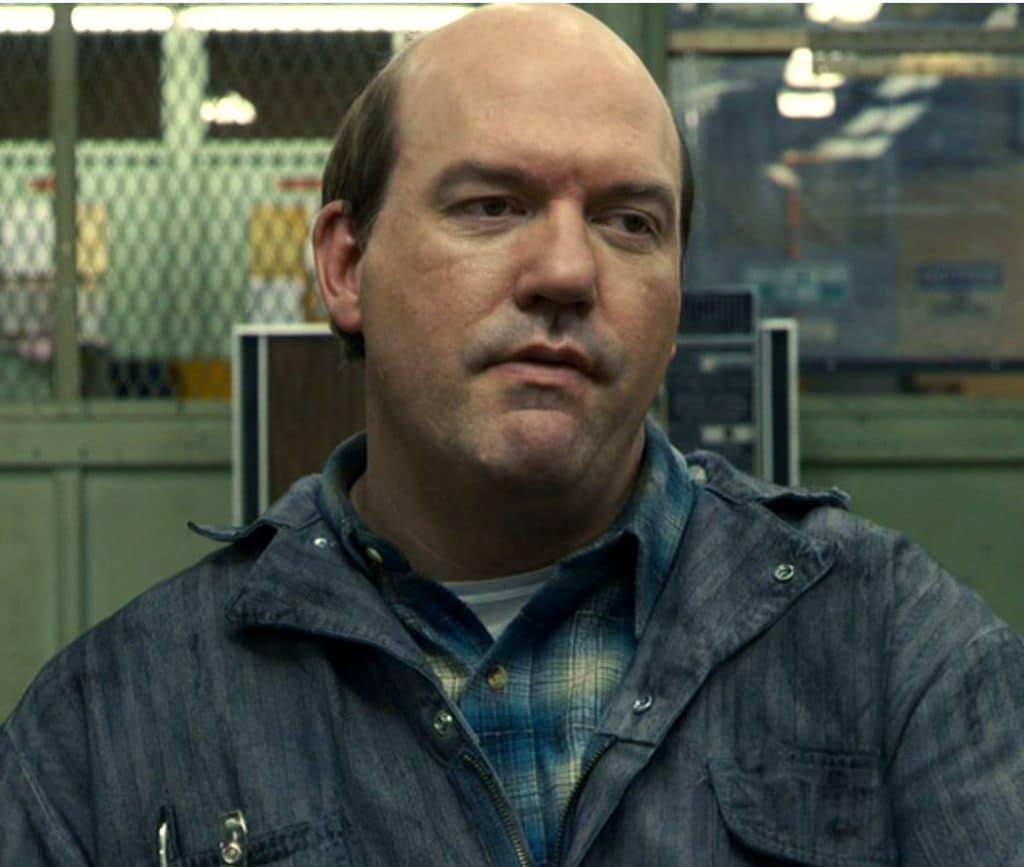Every month, we at The Spool select a filmmaker to explore in greater depth — their themes, their deeper concerns, how their works chart the history of cinema, and the filmmaker’s own biography. With his latest, Mank, now on Netflix, we’re spending December rifling through the cold, exacting details of David Fincher and the ways his music-video-inspired aesthetics changed American filmmaking. Read the rest of our coverage here.
First and foremost, Zodiac is a movie about seeing. Seeing patterns, seeing possibilities, seeing threads to pick up and follow, even if they don’t end up going anywhere. Like Se7en, a great deal of focus is on the tediousness of a murder investigation: the collecting and comparing of fingerprints, tired looking men discussing clues in dank, poorly-lit offices, sparring with the media, and endless, often pointless phone calls. The violence in Zodiac is shocking, but brief, reserved to the first half hour of the movie. Even the use of crime scene photos is kept to a minimum. Unlike Se7en, David Fincher isn’t rubbing the horrors we inflict on each other in the audience’s face. Here, it’s something more subtle, the creeping fear of I know I’m right…but what do I do now?
Even if we didn’t know that the Zodiac murders were never officially solved, this is an investigation that seems doomed from the start. The killer chooses to commit his crimes in towns hundreds of miles away from each other, where jurisdiction creates chaos. He disguises his handwriting. His rambling coded letters to the press offer no clues except that he’s mentally ill (or pretending to be), and was inspired to name himself after a wristwatch brand. We’re used to the structure of a murder being solved in under an hour — here it takes place over a period of 22 years, and it still isn’t solved. Oh, we have a pretty good idea of who it might be, and if the law didn’t matter they could just throw him in jail and be done with it. But, as the characters are reminded several times, it doesn’t matter if someone “feels right” as a suspect — everything has to fall together.
In a darkly funny moment of meta commentary, the detective attend a screening of Dirty Harry, a movie directly inspired by the Zodiac murders, where evil is vanquished via gunfire at the end. Inspector Dave Toschi (Mark Ruffalo), the real-life stand-in for Detective Harry Callahan, dryly remarks “No need for due process, right?” Nothing about Toschi’s even-tempered, by the book personality would suggest that he would even consider simply tossing aside his badge and finishing off “the Gemini Killer” himself. That doesn’t mean he doesn’t want to, desperately. But he needs to do it the right way, the fair way, the way that may (and does, in this case) result in nothing but lost time and sleep.

When we first meet Arthur Leigh Allen (John Carroll Lynch) break room, there’s a click: it’s him. He doesn’t come into the scene shouting for attention, like John Doe in Se7en, he lumbers into the room, almost a little too casually. Even an innocent man would get a little sweaty at the sight of three unsmiling police detectives waiting to talk to him, but not Leigh. He’s slick, barely hiding a smirk as he answers their questions. Of course he’s been keeping up with media accounts of the case, so he’s able to talk about it with plausible deniability. When he mentions The Most Dangerous Game, it doesn’t feel like an accidental confession, but a challenge: I’m giving you this crumb, what are you going to do with it? It isn’t enough, though, and he knows it.
The interview scene in Zodiac would be framed the same way in Mindhunter, more than a decade later. The tight close-ups, the actors starting directly into the camera while speaking (something which rarely happens in the rest of the film), all create a sense of the walls closing in on…something. All too briefly Leigh Allen, who manages to weasel away thanks to some sketchy handwriting analysis. It’s Toschi who’s locked in instead, with Allen his only really plausible suspect, but not enough evidence to prove it. As of 2018, the United States had one of the lowest murder solve rates in the world, with more than one-third of murder cases either open or “cold.” Often it comes down to a lack of manpower, jurisdiction issues, or a lack of caring because of who the victims were. Much of it also comes down to there just not being enough: not enough evidence, not enough corroboration, not enough time. By the time they’re able to locate one of the Zodiac’s still-living victims, more than two decades later, and he makes a mostly certain I.D. of Leigh Allen as his shooter, it’s not as satisfying as it should be. We’ve been reminded numerous times at this point that the world has moved on, no one’s heard from the Zodiac in years, holy shit you’re still interested in that? It’s still not the last t that needs to be crossed so that Toschi can finally make an arrest, It’s still not enough. It never would be.
Toschi doesn’t get his car chase and big heroic shoot-out. Amateur codebreaker Robert Graysmith (Jake Gyllenhaal) ultimately profits from Toschi’s hard work, writing a best selling book about the case and presenting himself as the foremost expert on all things Zodiac. For Toschi it’s another case on the pile. He doesn’t want to move on, necessarily, but he can’t keep running in place either. It’ll just be something else tomorrow.